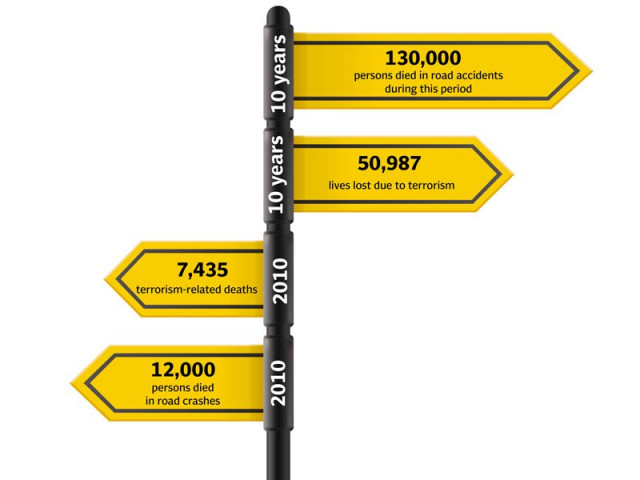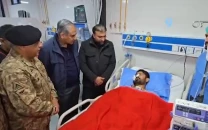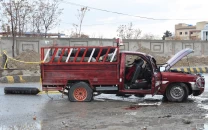Everyday menace: In Pakistan, getting to work more dangerous than militants
More deaths caused by road accidents each year than militant attacks, says WHO report.

More deaths caused by road accidents each year than militant attacks: WHO report. DESIGN: TALHA KHAN
Bombings and target killings may have much of the country worried about their personal security and that of their families, but there is a far greater threat to human life and limb that we perpetually expose ourselves to every day — the road.
In Pakistan, the number of deaths every year attributable to road accidents is almost thrice that of terrorism-related fatalities, mostly owing to lack of awareness about road safety and the appalling condition of road infrastructure.
The Global Status Report on Road Safety 2013 published by the World Health Organisation (WHO) declared road accidents in Pakistan a leading cause of death for young people aged 15-29.
The report recorded at least 5,192 deaths in 2010, but the National Highway and Motorway Police (NHMP) and Rescue 1122 put the annual death toll due to road accidents at around 12,000. The report said that no fatality reduction target has been set by the government and other concerned authorities, nor are any tangible efforts being made to make roads safer.
Meanwhile, according to the South Asia Terrorism Portal, 7,435 people were killed as a result of the militancy the same year, while 50,987 people have been killed since 2003.
The report also reflects on the dismal condition of road infrastructure in Pakistan due to irregular safety inspections of existing roads.
The absence of a policy for promoting investment in public transport — which the government is expected to fund — is also noted, although since then, a number of much-touted bus projects have been initiated.
Regarding post-crash care, the report acknowledged the lack of an emergency room-based injury surveillance system, along with a dearth of well-trained nursing staff for emergency situations.
Fatalities from road accidents indicated that 41 per cent were pedestrians, four per cent drivers, and 39 per cent passangers, while the rest were grouped under “others”. The report delineated how road traffic injuries remain a public health problem.
“To reduce the number of road traffic injuries, the pace of legislative change and enforcement needs to be hastened and more attention paid to vulnerable road users such as pedestrians, cyclists and motorcyclists,” urged the report.
“The government, in collaboration with private organisations, should also set and promote awareness for a walking or cycling policy,” said NHMP Superintendent Tahir Khan.
He said that over 40,000 lives have been lost in Pakistan due to terrorism, including militant losses, in the last 10 years. However, in the same period, the number of deaths due to road accidents exceeded 130,000, he said, adding that the number of casualties can be reduced if the public and private sectors join hands in promoting road safety and compliance with traffic laws.
Khan added that overall, the state response to road safety is practically zero. He requested the media to highlight the issue and create awareness.
Citing the WHO report, he said that developing countries are suffering a loss of $65 billion to property every year due to road accidents.
He cited four major reasons for accidents including faulty engineering, inappropriately-designed roads, use of inferior road construction materials and loss of control while taking sharp turns. He also invoked mechanical issues in vehicles and environmental causes such as rain and fog, which reduce road visibility and manoeuvrability.
He said 90 per cent of drivers are responsible for their accidents either because they are unskilled, have little legal knowledge or are simply indifferent to depriving people of their precious lives.
“The general public’s attitude also promotes unfortunate incidents, because everyone wants to reach home fast, even at the cost of bending the rules,” said Khan.
Published in The Express Tribune, February 10th, 2014.



















COMMENTS
Comments are moderated and generally will be posted if they are on-topic and not abusive.
For more information, please see our Comments FAQ